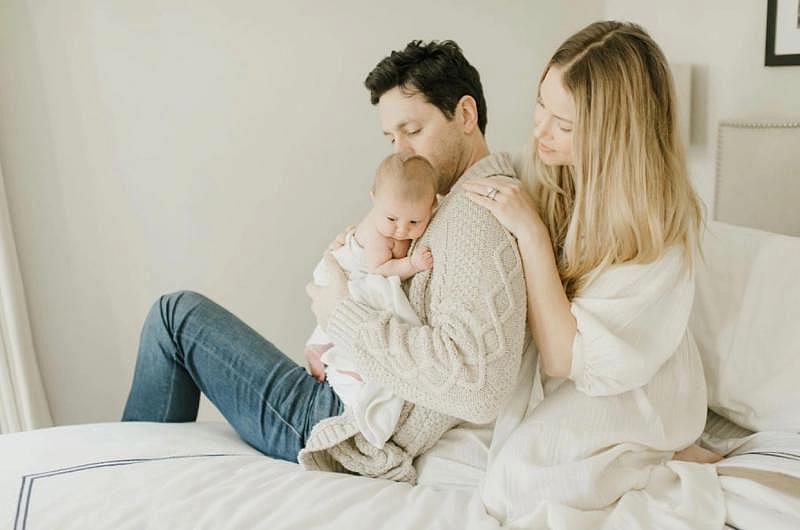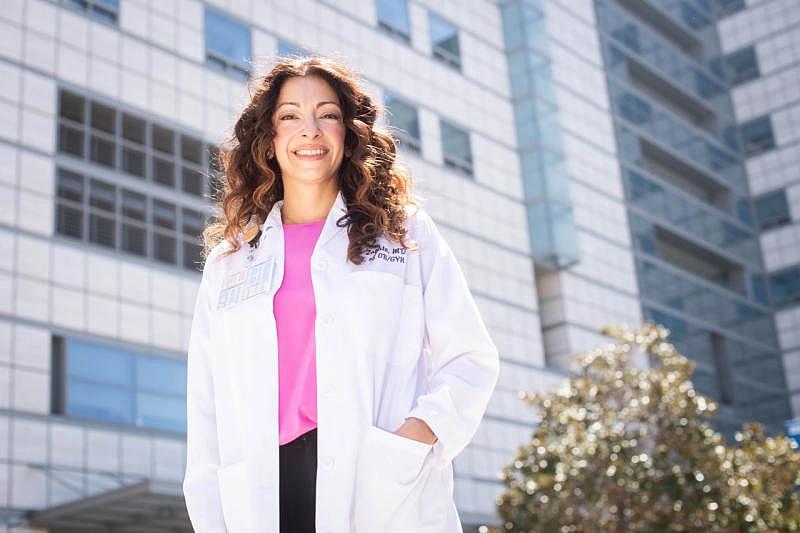Pregnant during pandemic: Expectant mothers remain at high risk of COVID-19
This story is part of "Pregnant During Pandemic," a series by Olga Grigoryants, a participant in the USC Annenberg Center for Health Journalism’s 2021 California Fellowship.
Her other stories include:
Part 1: Pregnant during pandemic: Programs, midwives step up to support Black mothers
Part 2: Pregnant during Pandemic: Black midwives in demand; are there enough to handle influx of clients?
Part 3: Birth centers grow in popularity, but owners say it’s difficult to qualify for state license
Part 4: Pregnant during pandemic: COVID-19 fears fuel increased interest in home births

Nicole Taylor sits on the bed where she gave birth to her daughter Lily weeks after being infected with COVID-19 with her husband Sam Rubin and son August by her side.
Courtesy: Lyndsey Yeomans.
Nicole Taylor sits on the bed where she gave birth to her daughter Lily weeks after being infected with COVID-19 with her husband Sam Rubin and son August by her side. Courtesy: Lyndsey Yeomans.
Nicole Taylor was planning her baby shower last November when her son came back from preschool with a stuffy nose.
The pandemic was sweeping across Southern California, but the preschool followed stringent precautions, so Taylor brushed off any concerns about her son being infected with coronavirus.
A few days later Taylor, who was 34 weeks pregnant and preparing to deliver her baby at home, came down with a fever.
“My whole body just shut down and my skin hurt on my back,” Taylor, 37, said.
After she tested positive for COVID-19, she couldn’t stop thinking about how the deadly virus might affect her unborn daughter.
“We were really concerned about the baby,” she said.
Unknowns in early days
Obstetrics Service Chief Dr. Mya Zapata says the birth center at Ronald Reagan UCLA Medical Center in Westwood supports all births from hypnotic to high-risk births. (Photo by Sarah Reingewirtz, Los Angeles Daily News/SCNG)
In the early days of the pandemic, expectant mothers grappled with uncertainty about the longstanding impact of the coronavirus. Many wondered how the virus would affect their pregnant bodies and worried whether they would pass it to their babies and if it would cause complications or even death — questions not many health care workers were able to answer at the time.
Now, while experts are still collecting data and conducting research, they have been able to identify risk factors and find effective prevention measures for expectant mothers and their newborns.
Studies have shown that the vaccines are safe in all stages of pregnancy and are effective against COVID-19 and the highly transmissible delta variant.
“Many women express concerns about unpredictability,” said Dr. Mya Zapata, an obstetrician-gynecologist at UCLA Health in Los Angeles. “I do my best to reassure them that there are many things about reproduction that are unpredictable and we do our best to prepare and know what’s important to that person, so we can make the right choices for them.”
Researchers launch study
Back in March 2020, when many factors were still unknown about the virus, a team of researchers at UCLA and UC San Francisco launched a study of pregnancies affected by COVID-19, recruiting 594 women from across the country who were up to six weeks pregnant and had a confirmed or suspected case of the coronavirus.
Dr. Yalda Afshar, of the Department of Obstetrics and Gynecology at the David Geffen School of Medicine at UCLA, said she created the Pregnancy Coronavirus Outcomes Registry after realizing there was not enough data on the effects of the virus on pregnant women and their babies.
As an obstetrician who works with women with high-risk pregnancies, she sought to understand how to counsel expectant mothers and help them navigate their pregnancies during the pandemic.
“We were flying a plane while building a plane,” Afshar said. “The registry started really early on in the pandemic and we were recruiting patients at the very start.”
Researchers focused on collecting patient-reported outcomes and patient experiences through their pregnancies and the postpartum period, examining medical records of women as well as neonatal pregnancy records and collecting blood, placenta and urine samples.
The study included nonhospitalized pregnant women and that allowed the team to follow prepartum, neonatal and postpartum patients infected with the virus, collecting and analyzing the clinical data.
Afshar said the most common symptoms women in the study experienced were cough, sore throat and body aches. Nearly half of women had symptoms after three weeks and about a quarter experienced prolonged symptoms lasting up to two months or even longer, researchers found.
Other key findings included symptoms related to the virus that were similar to symptoms experienced during normal pregnancy, including fatigue, congestion and nausea. Women also had shortness of breath, vomiting, diarrhea and runny nose. Nearly 6% of women in the study had a loss of taste and smell.
Researchers also discovered that pregnant people with COVID-19 have a higher chance of ICU admission.
But the newborn-related data has been reassuring overall, Afshar said.
The majority of 179 babies born to mothers with COVID-19 were healthy in the first two months after birth, according to the UCLA study.
“The rate of pregnancy loss or miscarriage was not significantly higher in those that get COVID versus those that don’t,” Afshar said.
Family infected
A few days after Taylor learned that she was infected with the coronavirus, her husband and 60-year-old mother tested positive as well.
Luckily, her case was mild and Taylor stayed in the bed just for a couple of days before starting to feel better. But it was not until a week before she went into labor at 40 weeks and four days at her home that everyone in her family finally tested negative for the virus.
“We got really lucky that everything worked out and our midwife was able to come out,” she said, referring to her licensed midwife, Blyss Young.
Her daughter was born healthy but very skinny. “The only reason we could think of was COVID,” Taylor said.
By the end of September, about 12,940 pregnant women had tested positive for COVID-19 in Los Angeles County. Nearly 76% of them were Latino, 11% were White, 5% were Black and 5% were Asian. Across the county, 62 infants tested positive for COVID-19 and 12 pregnant women with COVID-19 passed away, according to the Los Angeles County Department of Public Health.
So far nearly 125,000 pregnant women were infected with COVID-19 nationwide, about 22,000 of them were hospitalized and 161 died. Roughly 97% of pregnant people hospitalized with coronavirus were unvaccinated, according to the CDC.
With the rise of COVID-19 cases among pregnant women, the U.S. Centers for Disease Control and Prevention urged expectant mothers, breastfeeding women and anyone planning to become pregnant to get vaccinated.
Zapata said she recommended not just pregnant women, but also breastfeeding mothers get vaccinated.
“The thinking is (the vaccine) will provide some protection for the newborn, based on what we know about vaccines and the antibodies passing through the placenta,” she said. “When the baby is born, it will likely have some passive immunity as well.”
Still, it’s important for expectant mothers to have a conversation with their health care provider, Zapata said, “so that their health care provider can best support them.”
[This article was originally published by Los Angeles Daily News.]

